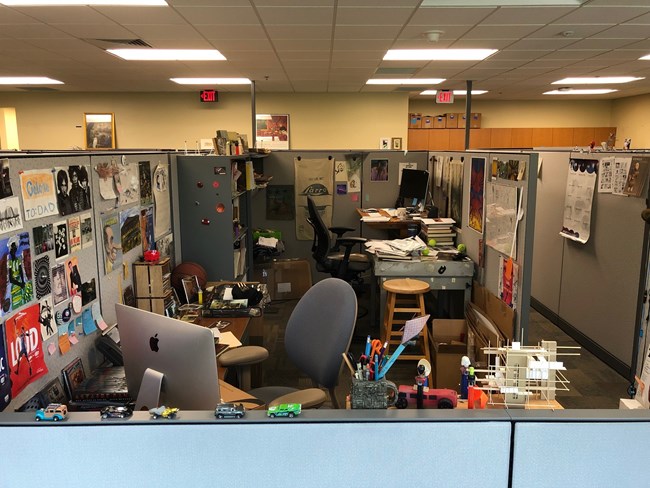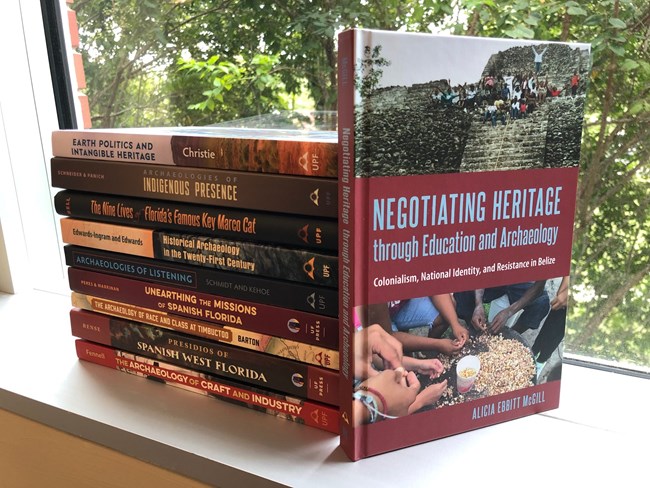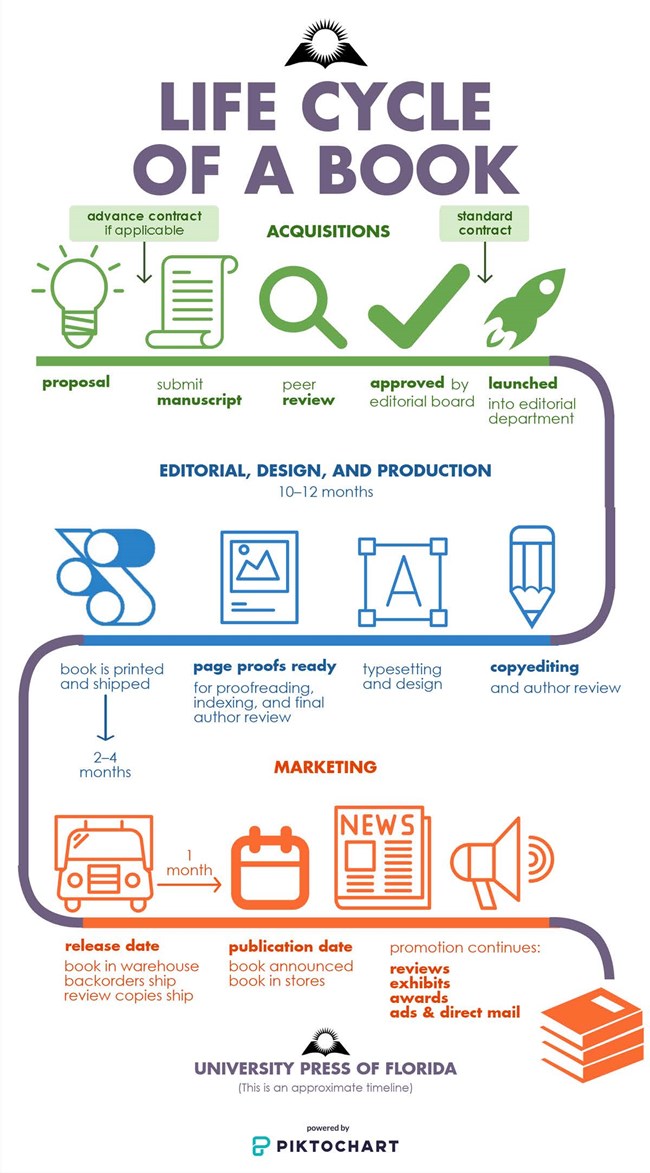Last updated: July 20, 2023
Article
Podcast 115: Book Publishing in Cultural Heritage
Getting in to Publishing

Image courtesy of UPF
Mary Puckett: Mary Puckett. I'm an associate acquisitions editor at the University Press of Florida.
Dr. Catherine Cooper: Can you tell us a little bit about your background and how you got involved in publishing?
Mary Puckett: I have probably a similar career trajectory of a lot of people in scholarly publishing, which is I started working at the Press while I was in graduate school just as a part-time job. And I just really liked working at the Press, that career appealed to me more than an academic career path. I really liked that I got to work with scholars and scholarly ideas, but I also got to do fun things. I got to go to conferences and talk to other people about their ideas a lot. In academia, a lot of times it feels like you're limited to thinking about whatever you're working on specifically, but publishing is a great opportunity to be able to talk to other people about what they're thinking and doing and working on. That's what really appealed to me about the publishing process and working in book publishing.
So, I just stayed at the press. I graduated so that was great, I was proud of myself for finishing, but I just stayed at the press and I was lucky enough to have job opportunities open up to me here. Your career in scholarly publishing is an apprenticeship model where you start out as an assistant to an editor and you learn the basic things you need to know about making a book and all of that and then you start to gain knowledge about different parts of the process and for me, that's the acquisition side of publishing. So, I started to learn more about how to acquire book projects and how to talk to prospective authors and how to deal with situations that can come up that are kind of tricky and how to negotiate those things. So you just learn gradually on how to do it and then a job opened up for me here at the Press and so I just stayed; and I really like working at UPF specifically.
Choosing Manuscripts and Creating a Catalogue

Image courtesy of UPF
Mary Puckett: The books in my subject area are archeology books. Part of that is the cultural heritage studies list and we have a series in that list too. So, I work on heritage studies projects and the archeology list in general. The first thing that I look for is how well a book project will fit in with our existing catalog of books and that has to do with some things like our ability to market books. We know what our audience is for our archeology books and so we want books that are similar to the books that we already have so that we can sell the books appropriately and so that we can reach the right readers.
So, that's the biggest part of it is just that fit within books that we already have published, but I also try to find ways to branch out into new topics. And so I'll try to figure out if it's a book on another part of the world that we haven't published on, maybe it fits in with a theme from a book that we've already published that's about a place in North America or something. So, I try to find those connections and that can help us to branch out a little bit.
I don't really have requirements. You don't have to be a tenured professor to submit a book proposal. It can be anyone, I'm happy to talk to even graduate students if they're thinking about publishing a book in the future. The publishing process can be such a mystery and so I've tried to make myself available to junior scholars and graduate students who are just wondering about what publishing a book is like and I'm open to reading proposals from all career levels, all backgrounds. And I've even read proposals that I don't think would be a good fit for the press, but because I have a knowledge of what other scholarly presses publish on, I can recommend the press that would be a better fit for that project. So, I'm happy to provide advice on that too.
So at UPF, and I think this is the same for a lot of scholarly publishers, we do not accept unrevised dissertations. So, an unrevised dissertation just means your dissertation as you wrote it, you didn't do anything to change it, it still reads like a dissertation, you've got your literature review and the whole formula. Dissertation revisions are just fine to propose for book ideas and I think it can be a good idea to talk to an acquisitions editor if you're thinking about revising your dissertation to get their feedback on parts of the dissertation that you would maybe want to leave out, maybe things that should be added to.
I always give prospective authors who are revising dissertations some book recommendations for them to read for strategies on revising their dissertation, things they should leave out, things they should keep in. I don't discriminate against revised dissertations, I think they can be really great books, but they do take a lot of work to revise and to make actual books. But if an author is willing to put in that work, I'm happy to work with them on that.
The Publishing Process

Image courtesy of University Press of Florida
Mary Puckett: Yeah. It's a mix of all three. Usually, it's a proposal or an idea and I can help authors put together a proposal. I can tell authors what kind of materials we need to consider their proposal for a contract and to put that together. Sometimes authors send full manuscripts. That's not as common because usually authors want some, and understandably so, they want some kind of commitment from a press before they put all the effort into writing a manuscript. And also the feedback that you can get just from a proposal can be really helpful for writing the full manuscript. So, it's usually a proposal, I often reach out to scholars I think would be good authors for our press, authors who are working on some kind of research that fits in with our list or that sounds really interesting or fascinating and so I've reached out to authors to ask if they want to publish a book before.
And so there are three main parts of the publication process. So, the first part is the acquisitions part. So, that's the proposal part and I'll review the proposal and talk with the author about it. We'll decide if we want to do an advanced contract and that means that it's a publishing contract that's signed before the peer review process. The other route is called a standard contract, and that's where the contract is signed after the review process. At UPF, our advanced contract process is pretty straightforward. So, we tend to do a lot of advanced contracts. We'll talk about those details with the author and then we'll sign the advanced contract and the author and I will decide on a due date for the manuscript.
And then once the manuscript is in, the next main part of the acquisitions process is the peer review process and that's what really distinguishes university presses from trade presses is that peer review process. That's the bulk of my job is shepherding manuscripts through the peer review process. I work with authors on that. I choose the reviewers and communicate the reviews back to the author and talk with them about how to move forward with their revisions or anything else that can improve the manuscript. At UPF, we require two peer reviewers to recommend publication in order to move on to the next step.
So, once the peer reviewers approve the manuscript for publication, we then send the project to our faculty editorial board for final publication approval. And the faculty editorial board reviews the review process, which sounds very confusing, but they'll just make sure that the review process has been rigorous and that the author has responded to the peer reviews appropriately. And so it's usually a pretty straightforward process of the board approval so long as I've done my job appropriately.
The next main big part is preparing the manuscript for our editorial design and production department. So, that's when the final manuscript is ready to go. It goes to our editorial design and production, or EDP department, and that's where the manuscript really becomes a book. It’s typeset and placed, copy edited and all of that.
And then the final step is the marketing phase and that's where the book gets sent to conferences or to bookshops, where it's physically published, it's ready to go to buyers. We have a great marketing department, and we have a pretty good idea of how to sell our archeology books for example, and our other disciplines too, I'm just not acknowledgeable about those. But we really appreciate author engagement with the marketing side of things.
It can really improve sales.If the author is good about promoting their book on social media or if they do book talks. Any opportunity that the author has to incorporate their book into their work just to advertise for it in some way is really appreciated by us. And there can also be those little niche conferences that we may not be aware of that we could advertise the book at. We ask authors for those kinds of events or places that we may not know of that we could use to sell the book and raise the book's profile. So, we really like it when authors are participatory in that process, it's helpful for us and we learn from it.
Dr. Catherine Cooper: How similar or different would you say it is, and how, to publish a book as opposed to a scholarly article?
Mary Puckett: The review process actually can maybe sometimes take about the same amount of time, which is interesting. Everyone’s so busy and there are all kinds of timelines with COVID delays and things like that these days. So I think the review process could be comparable, but I think it’s definitely more work to write a book than an article. It’s a really sustained argument. Some of the same steps are involved as far as you have to get permissions to publish images and books the same way you do for a journal and images need to be a certain size and resolution and I think that journals have those same or similar requirements, but definitely the book project it’s a long game. I don’t know if I have any specific guidance on how to determine if something is an article or a book. I think if you can think of three or four solid chapter ideas, it could probably be a book.
Recommendations for Aspiring Book Authors

Image courtesy of UPF
Mary Puckett: The first step would be determining if you have a book project and then the second step would be thinking about where you would want to publish your book and maybe reaching out to the acquisitions editor at that press. We're always happy to hear from prospective authors and to talk about book proposals that's the fun part of our job and it's almost never a bad thing. Like I said, if it's not a good fit for whatever press you have in mind, that editor may be able to tell you what publisher would be a better fit for your book and so that could be a helpful next step. Think about what you have in mind. It can be just a letter of interest to an acquisitions editor telling them “This is something I've been thinking about, I don't really have a timeline, I don't have a manuscript, but I wanted to get your feedback on it.”
Even questions like that are perfectly fine to send to an acquisitions editor and it can be really fun to talk about the projects at that stage because it's so early, it's really exciting. At UPF, we don't really have timelines in mind and so even if your idea is several years out, it still doesn't hurt to talk to a prospective editor about what you're thinking.
Dr. Catherine Cooper: How would you recommend a prospective author go about choosing an acquisitions editor to approach?
Mary Puckett: I would say that if it's a scholarly book especially, to look at what publishers have published the books that you turn to the most and that you like the most in your field. That's probably going to be the first indication of the press that publishes books like the one that you're going to write. If it's a book on archeology, hopefully, you'll see that UPF has published a lot of those books! Because we have published a lot of archeology books. And so that's one way to figure out where your book fits in with the grand scheme of scholarly publishing. So, that's where I would start. Maybe if you have a book that's a model, that's something that I advise, see who published it and then just go to that publisher's website and you can usually find the list of acquisitions editors for the different subject areas and then find an email address for them. And as easy as that.
Dr. Catherine Cooper: Great. Thank you so much for talking to us today.
Mary Puckett: Thank you. This is great.
Read other Preservation Technology Podcast articles or learn more about the National Center for Preservation Technology and Training.
